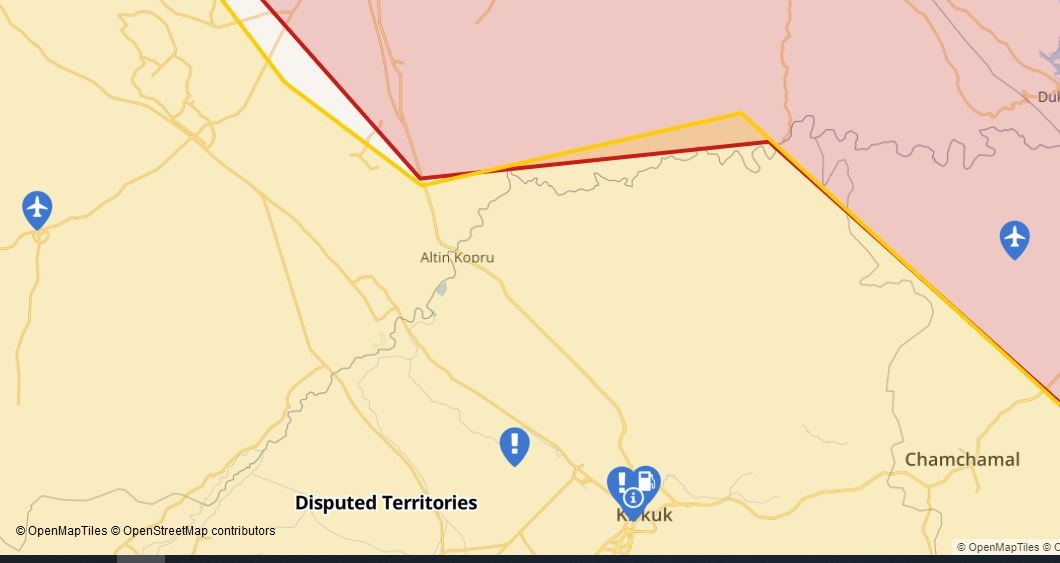1.2K
Kirkuk
- On June 22nd, two rockets targeted the Khor Mor gas field near Qadir Karam district. No casualties were reported, and according to preliminary reports, Iranian-backed militias fired the rockets from Tuz Khurmatu district. UAE’s Dana Gas has operated the Khir More gas field since 2007, and recently the company has been targeted by the Iranian regime in Erbil as well.
- On June 21st, a high-level Iraqi security delegation arrived in Kirkuk, marking the 13th visit this year. The delegation, led by two senior Iraqi security commanders, Abdul Amir Shamri, deputy commander of joint operations in Iraq, and Saleh Nasser al-Amri, commander of the federal police forces, “reviewed” the security situation in the province and “assessed” the measures taken by the security units in the fight against ISIS (Da’esh). Meanwhile, a delegation of the Peshmerga forces visited Baghdad in a new attempt to implement the previously agreed upon joint forces for Kirkuk and other disputed territories. Da’esh terrorists remain active in Kirkuk province, Iraqi forces announced the death of two militants near Daquq on June 17th.
- The Deputy Director of Kirkuk’s Migration and Displacement, Abdullah Fazel, announced the remaining 50,000 displaced families in the province. Fazel added that out of 120,000 displaced families from Baghdad, Diyala, Mosul, and Saladin, 70,000 have returned, remaining settled in Kirkuk. Despite the liberation from Da’esh in 2017, families refuse to return due to a lack of primary services and security.
- After the increase in gas prices, residents and taxi drivers held six demonstrations in several areas in Kirkuk, demanding fair prices and distribution. Kirkuk’s administration and the Iraqi Oil Ministry have been at odds regarding the distribution schedule. Separately, the head of the engineering team of North Oil Company in Kirkuk (NOC), Farhad Hamza, warned that “Kirkuk oil fields are drying up” due to the lack of repairs and rehabilitation plans. Hamza said, “In 2005, more than 600,000 barrels of oil were produced daily in Kirkuk, and now production has halved,” In the past, the British Petroleum (BP) repaired some oil wells, but they did not renew their contract with the Iraqi government.
- On June 18th, a grenade targeted the Turkish-backed Turkmen Front headquarters on Kirkuk street, next to the National Security Agency. In the following days, the Kirkuk police deployed security forces near the headquarters of the party after “intelligence information to target the headquarters.”
Khanaqin
- On June 17th, a Turkish drone targeted a Jeep carrying five people, including two women, between Jalawla and Kalar districts near Barlut village. As a result, four of the five passengers were killed. The Turkish government claimed responsibility and said it hit members of the Kurdistan Workers’ Party (PKK), but later it turned out that all the passengers were Syrian Kurds, including Farhad Shabli, Deputy Vice President of the Joint Executive Council of the U.S. backed Autonomous Administration of North and East Syria (AANES). Syrian Kurdish officials denounced the Turkish attacks and said Shabili was visiting the Kurdistan Region to receive medical treatment.
- On June 21st, Da’esh terrorists fired five rockets at the Kurdish Tajnidi neighborhood of Jaloula district. Three rockets landed on a football field, and the other two hit a neighborhood street, injuring a woman and her child.
Tuz Khurmatu
- On June 17th, Da’esh terrorists attacked a position of the 52nd Brigade of the Iraqi army, killing a soldier and three others wounded in the clashes that lasted about an hour.
Makhmour
- Ghazi Faisal, a Kurdish commander of the volunteer fighters in Makhmur district, warned of increased movement of Da’esh terrorists between Mosul-Kirkuk-Tikrit. Faisal said some of the Arab villages are aiding the terror group. The triangle between the three cities was one of the most dangerous bases for terrorist groups from 2003 to 2014 and is considered a bridge between the three cities.
Shingal (Sinjar)
- On June 20th, a Turkish drone struck a house in the Shingal district. The Turkish attack resulted in damage to property belonging to the self-administration in the district. Hours before the Turkish airstrike, the building was evicted. The attack was the second in five days, leading to dozens of acts of aggression against the Yazidi Kurds.
- Amidst a lack in primary services, including in the health sector, dozens of diarrhea cases were recorded among children. Dilshad Ali, director of Sinjar General Hospital, told reporters that high temperatures and lack of clean water are the leading causes of the disease’s spread.

